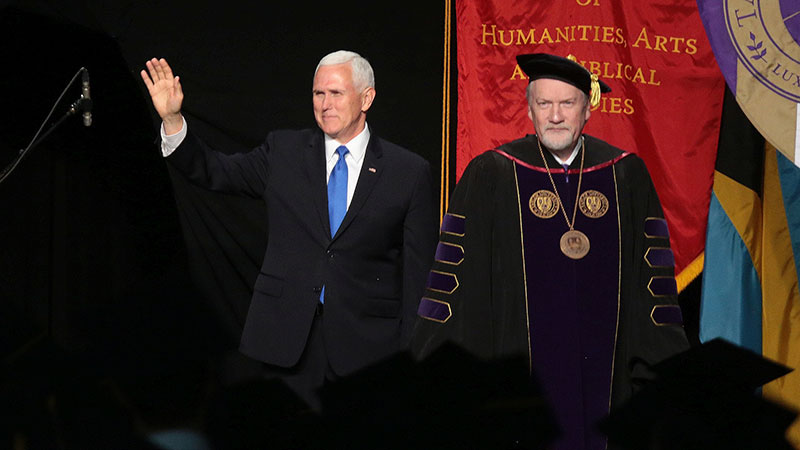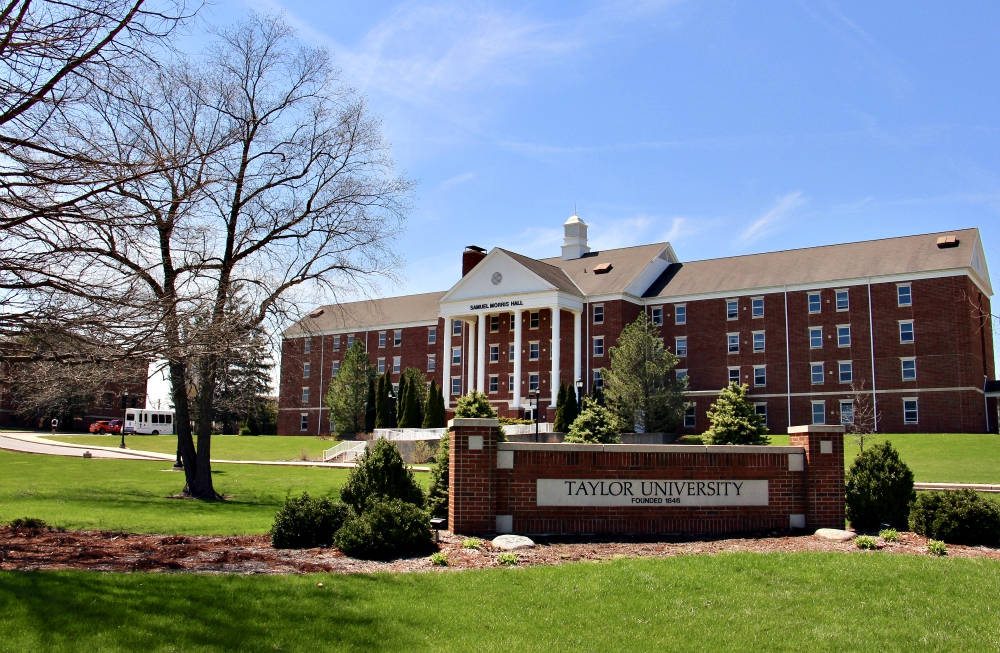
Vice President Mike Pence, left, attends the 2019 Taylor University commencement at the invitation of President Paul Lowell Haines, right. (RNS/Courtesy of Taylor University)
Nothing like an anomaly to jump-start the brain. A river that flows uphill. A donkey who befriends a wolf. A planet with rings. How about an evangelical college that welcomes diverse points of view?
The college would be Taylor, actually a university in the cornfields of Upland, Indiana, which, given the university's strict conservative religious and political setting, encourages an identity as stereotypical Donald Trump territory. Well, not so fast. Events of the past month suggest a refreshing exception.
Last week, Taylor's president, Paul Lowell Haines, resigned after just three years at the helm. The university's board emphasized that he hadn't been pushed out or quit. That was a shock, given Haines' decades of service as a popular administrator and president.
The mystery invited speculation that Haines' sudden departure was related to the flare-up that erupted over his invitation to Vice President Mike Pence, former governor of the state and an evangelical friend of the Republican right wing, as graduation speaker.
What happened was a far cry from the unified support evident on other conservative religious campuses. Dozens of protests immediately arose from faculty and students who rejected Pence as representative of the Christian faith, as they understood it, from his stands on a variety of Trump-related issues. At the May 18 graduation, Pence extolled Trump and his policies, and the protesters walked out.
But the walkout wasn't treated as heresy or intolerable. It ruffled the proceedings and upset many onlookers, but it appeared to stay within boundaries of acceptable, though contentious, behavior.
The weeks before and after the debate and disruption, Haines, who had acknowledged the dispute, kept silent about the controversy and didn't mention it when he abruptly resigned. He made no effort to link his action to the conflict, leaving only an ambiguous explanation at an earlier stage that he'd invited Pence with the "best intentions." He allowed that his choice had been a "deeply emotional challenge," presumably for all sides, and left it at that, without casting blame or adulation on anyone. Open-mindedness?
In retrospect, it's plausible that he'd had a genuine crisis of conscience after seeing merit in both sides and deciding to remove himself as a potential impediment to further open exchange of ideas. A 1975 graduate of Taylor, Haines had spent many years as a legal counsel to colleges and universities and tax adviser to nonprofit institutions such as museums, churches and veterans organizations, positions that encourage open-mindedness.
Thanks to excellent coverage by Emily McFarlan Miller of Religion News Service, evidence of an untypical evangelical intellectual climate has gained wider media attention.
She quotes from an email from Haines to the Taylor community, for example, that seems to justify disputes such as the Pence dustup. "We have always been a community that, while deeply and firmly grounded in our Christian faith, celebrates what is unique about each individual and encourages diversity of thought and personhood."

The Taylor University campus in April in Upland, Indiana (RNS/Emily McFarlan Miller)
Haines' tenure as president was a short three years but he speaks from intimate acquaintance with Taylor's legacy. It was founded in Fort Wayne, Indiana, in 1846 as a women's college and has become a top-ranked undergraduate university of roughly 2,300 students. It tied with Michigan's Calvin College for the No. 1 Best Regional College Midwest by this year's U.S. News & World Report college rankings. It remains solidly traditional on marriage and sexual ethics, requiring students to reject sex outside heterosexual marriage, but has been showing signs of a liberal trend in politics.
When Pence was announced as graduation speaker on April 11, opposition quickly arose. The faculty disapproved by a 61-49 margin, the administration held three open forums on the debate, and student news accounts expanded on the scope of the division. By the start of May, competing pro and con petitions showed about 5,900 names supporting the Pence choice and 7,200 against it.
The protest petition, begun by a 2007 graduate, read in part: "Inviting Vice President Pence to Taylor University and giving him a coveted platform for his political views makes our alumni, faculty, staff and current students complicit in the Trump-Pence Administration's policies, which we believe are not consistent with the Christian ethic of love we hold dear."
A significant number of students told Miller that there was room for opposing views. One student told her, "I think, as a university, this is the place where you need to have all sorts of different opinions because people are here to learn. We're not here because we have everything figured out. We're here to learn new things from new people."
Advertisement
No institution or group is free of division and difference, no matter how forceful the pressure for conformity and seeming blind loyalty, and that extends to evangelicals as well as everyone else. That doesn't necessarily produce open protest but the contradictions don't lie far under the surface. Fear is usually the main culprit in stifling open expression.
For years, as a newspaper reporter, I resisted the common assumption by editors that priests, bishops and the pope defined real Catholicism, no matter how eloquently or vehemently the nonordained dissented from "official teaching." Rising tensions among major sectors of the church have widely changed that perception.
The Taylor campus exudes optimism about learning and making a helpful difference in the world. It is modestly endowed but well-equipped and confident in its future. It ability to allow diversity of political and intellectual thought implies trust in faith-based students to decide issues for themselves. Taylor's example is rare, not only among small colleges but also among large, swaggering universities that pride themselves on free thought while exerting control over it.
The Taylor episode leaves a mark in part from its mystery, those not totally explainable things that draw upon our curiosity to spawn ideas, hopes and insights we otherwise wouldn't have divined in a solely matter-of-fact world. They offer delightful deviation from what we've considered intact norms.
Haines, who will step down on Aug. 15, has in one way or another nurtured a much-needed sign of hope. His decision to leave office may be unrelated to the Pence affair, but circumstantial evidence suggests that paradoxically he believed the dispute showed Taylor at its best and concluded it was best to leave as a silent thumbs-up. He kept his own counsel, but in a picture taken on graduation day perhaps provides an inadvertent clue. He is standing next to Pence on the platform, bearing a sour look that suggests he's swallowed a spoiled tomato.
[Ken Briggs reported on religion for Newsday and The New York Times, has contributed articles to many publications, written four books and is an instructor at Lafayette College in Easton, Pennsylvania.]







